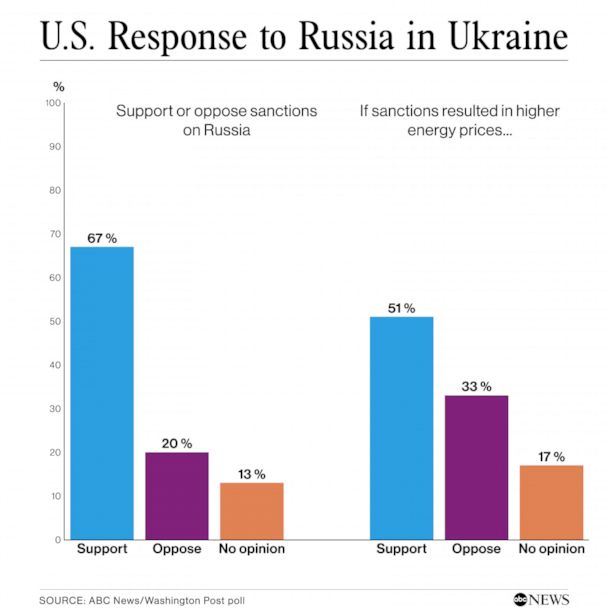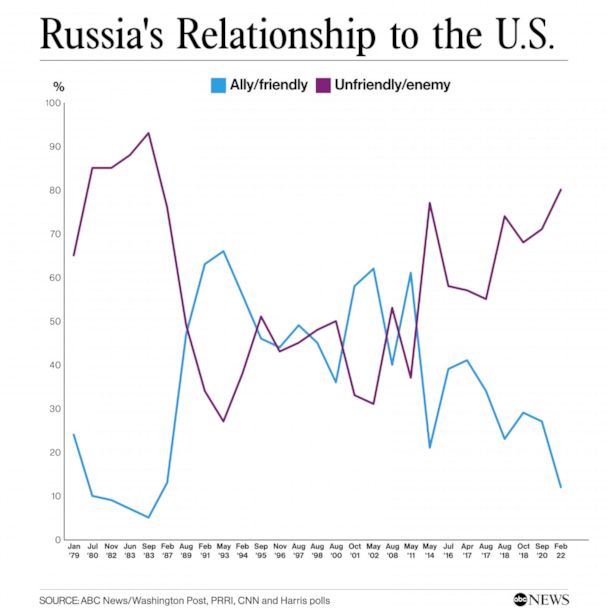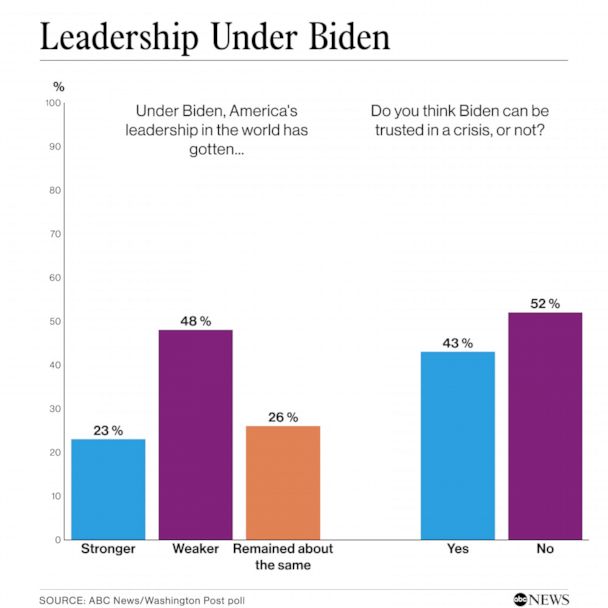Negative views of Russia near Cold War levels amid Ukraine crisis: POLL
Support for sanctions subsides to half if higher energy prices result.
Negative views of Russia have advanced to levels last seen during the Cold War and Americans broadly support sanctions in response to Russia's attack on Ukraine -- although support subsides to half if those sanctions raise energy prices in the United States.
President Joe Biden, for his part, gets more negative than positive ratings in this ABC News/Washington Post poll of his handling of the situation: Thirty-three percent approve while 47% disapprove, with the rest unsure.
See PDF for full results, charts and tables.
More broadly, nearly half, 48%, say U.S. leadership in the world has weakened under Biden’s presidency, twice as many as say it’s grown stronger. And he’s underwater in trust to handle a crisis, 43-52%, a tenuous position given the week’s events.
Sixty-seven percent support the United States and its European allies imposing economic sanctions on Russia, with 20% opposed and the rest unsure. If sanctions produced higher energy prices, however -- as Biden has warned -- support declines to 51%, with 33% opposed. That reflects economic discontent, with inflation at its highest in nearly 40 years.

This poll was fielded Sunday through Thursday night, including the periods in which Russia was menacing Ukraine and then, on Thursday, invaded. Attitudes may evolve as the crisis unfolds.
Most striking are views of Russia: Eighty percent see it as unfriendly or an enemy of the United States -- the most since 1983 (measured then as the Soviet Union), although it was similar, 77%, a few months after Russia invaded Crimea in 2014.
The current result includes 41% who now see Russia as an enemy of the United States, up from single digits in the early 2000s and early 1990's alike.
Just 12% call Russia friendly toward (or an ally of) the United States in this poll, produced for ABC by Langer Research Associates. That’s down from 62% in 2002 (a period of post-9/11 solidarity) and a high of 66% in 1993, two years after the fall of the Soviet Union.

Groups
Partisanship largely falls away in views of Russia -- large majorities of Democrats (86%), independents (81%) and Republicans (78%) call it either unfriendly or an enemy of the United States. So do 80 to 88% of political liberals, moderates and conservatives alike, an unusual level of agreement in these typically divided groups.
There’s a somewhat larger political gap on sanctions, which Biden initiated Tuesday, then increased Thursday -- 79% of Democrats support them, declining to 63% of independents and 62% of Republicans. Support for sanctions if they bring higher energy prices, for its part, is 15 percentage points lower among people already experiencing economic hardship because of inflation, compared with those not experiencing hardship.
On Biden personally, views revert to typical sharp partisanship, with independents -- usually the fulcrum in national politics -- siding negatively. Sixty-six percent of Democrats approve of Biden’s handling of the situation, dropping to 30% of independents and 8% of Republicans. Instead, 75% of Republicans and 54% of independents disapprove, compared with 13% of Democrats; the rest in each case are undecided.

Divisions are similar on trust in Biden to handle a crisis and on America’s world leadership. On the latter, 82% of Republicans say the country’s leadership in the world has gotten weaker under Biden, as do 53% of independents, compared with 11% of Democrats.
When the same question was asked in 2017 and 2018 about U.S. leadership under President Donald Trump, these divisions were essentially reversed. Overall, though, at Trump’s best, 30% said U.S. leadership had grown stronger, more than the 23% who say that of Biden today.
Methodology
This ABC News/Washington Post poll was conducted by landline and cellular telephone Feb. 20-24, 2022, in English and Spanish, among a random national sample of 1,011 adults. Results have a margin of sampling error of 4.0 percentage points, including the design effect. Partisan divisions are 27-26-40 percent, Democrats-Republicans-independents.
The survey was produced for ABC News by Langer Research Associates of New York, N.Y., with sampling and data collection by Abt Associates of Rockville, Md. See details on the survey’s methodology here.